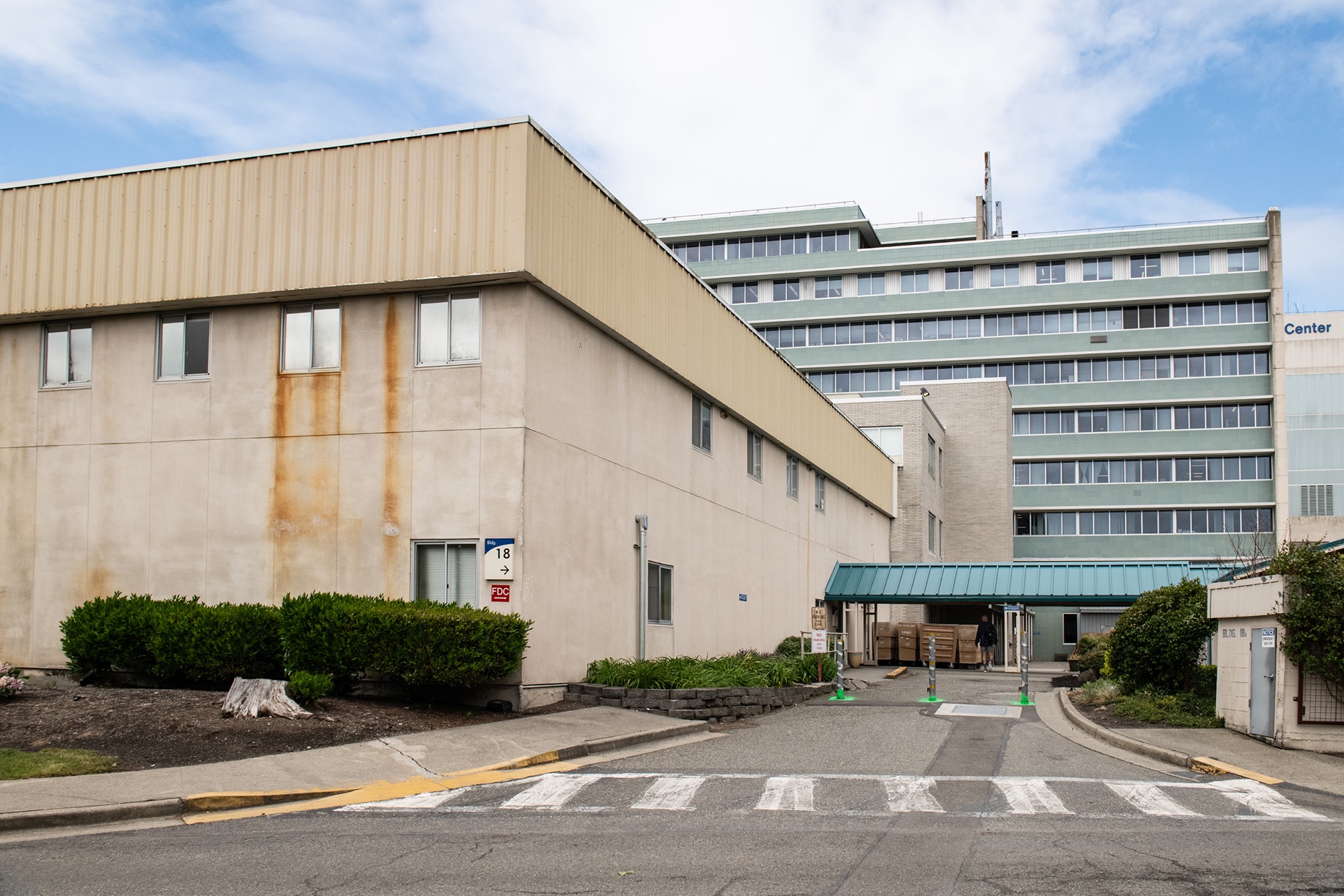
Seattle Veterans Affairs staffer alleges whistleblower retaliation
The chief of logistics for the Puget Sound hospital system says he’s being punished for speaking out about deteriorating building conditions
Watch
Listen
(Runtime 1:06)
Read
By Lauren Gallup and Lizz Giordano
A staffer for the Veterans Affairs Puget Sound Health Care System has alleged retaliation after he spoke out about the deteriorating conditions of a building on the south Seattle campus that housed specialty clinics and office space.
Douglas Galuszka, chief of logistics, was issued two suspensions totaling three weeks of unpaid leave this year. He said VA administrators punished him for calling attention to leadership failures at the hospital and talking with press. According to Galuszka, the two suspensions he served mark the only discipline he has received in his seven years working for the VA. Prior to the suspensions, Galuszka said, he was not counseled by a supervisor or required to go through training.
“[My supervisor] leaped from nothing to ‘I’m going to suspend him,’” Galuszka said, pointing to years of earning the highest possible rating for his work performance and other commendations.
In early June, Northwest Public Broadcasting and Cascade PBS reporters quoted Galuszka in an investigation that found patients and staff in Building 18 endured years of water leaks and a failing HVAC system that resulted in poor air circulation and temperature control. Conditions had deteriorated due to deferred maintenance on the building, which the VA had slated for demolition over a decade ago. The union representing staffers called the conditions “shocking” at the time.
Less than three weeks after the story was published, the VA relocated all services from the building’s South Clinic and all workers moved out a few weeks later. While the building is closed, Galuszka alleges that VA administration is still retaliating against him and his deputy.
“It is still not over,” Galuszka said. “They’re still coming at us.”
The VA declined an interview request and did not respond to questions citing privacy law, but the agency did issue a statement.
“Whistleblowers are respected, protected, and empowered at VA – and retaliation for making such disclosures is strictly prohibited,” wrote Tami Begasse, a spokesperson for the VA Puget Sound Health Care System. “We do everything in our power to build and uphold a culture where employees are held accountable for misconduct and every employee feels empowered and unafraid to raise concerns without fear of reprisal.”
Records show Galuszka’s boss, Susan Perez, the hospital’s deputy executive director, proposed the suspensions in February and July, after two internal investigations. The investigative reports concluded Galuszka acted inappropriately in handling the move out of Building 18 and in an interaction with a medical supply vendor.
The first suspension centered around two “charges.” One was over the effort to vacate the building, in which Perez said she directed Galuszka to list logistics staff who could move to a rented space in Georgetown, according to VA documents. Perez said Galuszka never followed this order.
Galuszka argued Perez would have needed union approval to move these employees to a workspace not included in their contract. Email communications from the American Federation of Government Employees (AFGE) Local 3197 president show the union had not authorized a move and demanded to bargain over any change of location.
The second charge centered around Galuszka’s storage of excess work equipment in a different building, even though he knew this was not approved. He also allowed some employees to work in the building.
Galuszka and his deputy, Cortez Hopkins, said that toward the end of 2023, they felt they had to find a safe workspace for staffers.

Building 18 of the Seattle VA Campus in Beacon Hill, where documents show a broken HVAC system as far back as 2017, resulting in no heat or air conditioning or air circulation, even during the COVID-19 pandemic. (Credit: Caroline Walker Evans for Cascade PBS)
The suspension was also reviewed by an executive director of a different VA system, Thomas Steinbrunner, who upheld it but reduced the number of days from seven to five.
After the NWPB/Cascade PBS article was published, Galuszka said the retaliation increased.
Within two weeks of the publication of a second article about the building closure, Perez proposed a second suspension, this time for 14 days. The charges stemmed from a March fact-finding report — requested by the deputy director of patient care services — which concluded Galuszka intimidated and bullied a vendor from a medical supply company.
The bullying complaint centered around a disagreement on how the logistics department handled an out-of-stock item. After the logistics staff made a purchase, a sales representative from a different company, one that often supplied that item, emailed a nurse manager at the VA. She warned that repurposed equipment might have been purchased, which is not allowed in the hospital system, according to a VA investigation.
The report stated Galuszka and this sales representative later met in his office. That sales representative told the investigator she felt bullied during that meeting and in subsequent interactions with Galuszka.
Recounting the meeting, Galuszka said he told the sales representative that she needed to come to him with concerns, and that she should not discuss the buying of equipment with nurses.
He said he was following VA purchasing policies by requiring the sales representative to communicate purchases only through the logistics department. He added that his staffers understood the rules and purchased only new equipment.
The VA report concluded Galuszka’s behavior toward the sales representative and a nurse manager was “uncomfortable and intimidating.”
Galuszka was also charged with making an unauthorized purchase of office equipment in December 2023. He said other divisions had made similar purchases in the past.
An outside medical director also reviewed and upheld the second suspension. Galuszka, who has served both suspensions, is appealing them under the VA grievance procedure.
Prior to 2023, Galuszka received top marks for his job performance, according to three years of performance evaluations. In 2020, he received a Congressional Fellowship for his work recruiting transitioning Department of Defense medical personnel into open VA positions.
The suspensions cost him three weeks worth of pay, a total loss of around $7,000, according to Galuszka. Besides the financial impact, Galuszka said the stress he has experienced over this past year at work has impacted his health and family life.
“Unfortunately, this becomes a big focus of discussion in the house,” Galuszka said. “My kids have noticed that. When we go on vacations, they say, ‘You can’t talk about work.’”
Galuszka noted the added stress can trigger severe headaches for which he used to sometimes take sick leave — a few days a week, for a few hours at a time — never using more than what he had banked. That stopped in September, after Perez decided this was an inappropriate use of leave, according to Galuszka’s personnel file. Now Galuszka needs a doctor’s note to take any sick leave, which he feels is another act of retaliation.
“It is a ludicrous system,” Galuszka said. “I can’t take my own earned sick leave.”
Galuszka’s deputy, Hopkins, also spoke with reporters for the two articles published about the conditions of Building 18. Hopkins has not been suspended or faced disciplinary action at work, but said he witnessed acts from VA leadership that feel like punishment. He said Perez told his staff to “stop being cynical” when they raised concern that the move from Building 18 would be delayed. He said he and his staff were crowded into smaller working environments when they attempted to find safer office space.
“It’s stressful coming to work like that when you can’t be yourself and do your job because you’re worried about what’s coming around the corner,” Hopkins said.
A 2018 report by the federal Government Accountability Office found that VA staffers who report “wrongdoing are more likely to receive disciplinary action and leave the agency than their peers.” It also concluded that by allowing the program offices or facilities where a whistleblower reported misconduct to perform the investigation can lead to potential conflicts of interest.
After the NWPB/Cascade PBS investigation was published, U.S. Sen. Patty Murray and Rep. Adam Smith called on VA administrators to explain what delayed vacating of the building. In the July 2024 letter, Murray and Smith asked the VA to provide a current timeline for the building and to commit to biannual briefings on the hospital campus with staffers from each office.
















